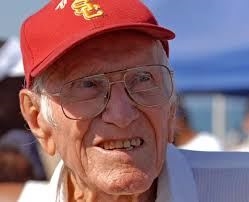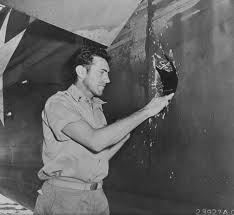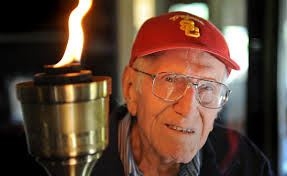 |
| www.biography.com () |
"People tell me, 'You're such an optimist,'. Am I an optimist? An optimist says the glass is half full. A pessimist says the glass is half empty. "A survivalist is practical". Zamperini says, ' Call it what you want, but just fill the glass,'. I believe in filling the glass," (Devil at My Heels). Louis Zamperini was a man who believed in others and did what he thought was right. Zamperini, son of immigrants Louise and Anthony Zamperini, was born January 17, 1917 in Olean, New York. At age two, the Zamperini family moved to Torrance, California. Zamperini was a delinquent for most of his young life until, his brother introduced him to track field during high school. Zamperini became so good that he broke several high school track records across the country. Zamperini then qualified for the 1936 Berlin Olympics where he had an amazing finish after sprinting the last lap. Zamperini began preparing for the 1940 Tokyo Olympics, until it was suddenly ripped away from him due to the start of WWII. After the war broke out, he enlisted in the U.S. Air Force as a bombardier until he was stranded in the Pacific after his plane crashed while ironically looking for another crashed airplane. With minimal provisions, Zamperini and two other men survived for 47 days, one however did not survive. Later, Zamperini was captured by the Japanese and held prisoner for two years until the end of WWII . Zamperini then returned to the US and a short time later married to a woman named, Cynthia Applewhite. Even after the war had ended, Zamperini couldn't let go of what had happened in the POW camps, ultimately becoming an alcoholic trying to escape the nightmares that had been created by the war and having nightmare about hurting the people who had hurt him. One day, Zamperini went to a revival held by Billy Graham, that immediately changed his life forever. Zamperini stopped drinking alcohol and and became a public speaker, camp founder that helped troubled kids, and also went back to Japan to forgive his captors in 1950. To be a hero, someone must be humble yet brave and selfless and have qualities or characteristics that inspire us to do better. Zamperini was brave during WWII, he struggled yet found his way again and helped others to do the same. More amazingly Zamperini forgave those who had hurt him and don't deserve to be forgiven but forgave them anyways. These characteristics qualifying Zamperini as one of the greatest heroes of all time.
 |
| Zamperini looking at a bullet hole in his plane. (en.wikapedia.org ()) |
A lesser man would have given up during all of the pain, suffering and grief that Zamperini had to endure during WWII while in the POW camps (prisoner of war camps). However Zamperini never gave up, " By strange chance, a Japanese officer at one of the camps had studied at the University of Southern California and recognized Zamperini. The Japanese thought a star athlete would have propaganda value, but Zamperini refused to denounce his country. Zamperini was then subjected to almost daily torture from a sadistic guard he called 'the Bird,'"(Washington).Zamperini was given the chance to leave the POW camps and work with the Japanese government. Zamperini was tempted by the offer by the Japanese. However, Zamperini declined the offer because in return, he would have to say messages against his country. Zamperini had a way out of the suffering in the prisoner of war camp, but he chose not to do it. Zamperini could have lived a luxurious life, but instead, he stayed loyal to his country and refused to lie about it and chose to not give up and that makes him a hero for not giving into fear and pain. Even though he knew that he would be punished harshly for his actions, Zamperini knew what was right and declined their offer. It wouldn't just be physical beatings that Zamperini would be coming back to, he would be coming back to a depressive state that just can't be shaken off."I could take the beatings and the physical punishment," Zamperini said, "but it was the attempt to destroy your dignity, to make you a nonentity that was the hardest thing to bear.' Zamperini said his athletic training had helped him withstand the torment. [...] 'For another thing, you have to have confidence in yourself and believe that no matter what you're faced with, you can deal with it - that you just can't give up. And then there's the aspect of staying in shape. And humor helped a lot, even in the gravest times,"(New York). Zamperini believed that he could survive the POW camp and that one day it would all be over. Zamperini had the courage and grit that helped him to survive during dark times. Yet despite the circumstances he did better than his peers, not loosing his comical personality. Zamperini was strong enough to remain mostly the same person through the whole ordeal; where others would have given up and died. Throughout WWII, Zamperini was certainly brave, yet he lost his way after the war but found his way back again and helped others do the same.
Whenever something horrific happens, people never come out of it the same and Zamperini is no exception. However, he found his way back with the help of Billy Graham and he helped others find their ways back as well. Others said, "He quit drinking and smoking and became a devout follower of Graham's. [Zamperini] spent many years working in real estate and coaching track in California and founded a camp for troubled youth and became a motivational speaker, often addressing military groups about his imprisonment,"(Washington). After the war, Zamperini became an alcoholic and almost got divorced with his wife Cynthia. However, he that one sermon forever changed his life, shooting him in the right direction. Zamperini threw out all the horrible things in his life and eventually became and inspirational speaker and founded his very own camp so that he could reach out to other people and help them. This qualifies him as a hero because he shows and inspires us to do the right thing and make the right decisions in life. Zamperini also inspires us by showing that even when we go into the darkest of places, we can always find our way back. After finding himself again, Zamperini turned his own life around and did extraordinary activities, " Zamperini straightened out his life, he said, after hearing a sermon [...]. For years afterward, he worked in commercial real estate and remained physically active into his 90's, skiing, running, mountain climbing and skateboarding. Zamperini was prominent on the lecture circuit. Zamperini also returned to Japan as a missionary and went back again to run a leg of the Olympic torch relay at the 1998 Winter Games in Nagano." (Washington). Through finding himself, Zamperini shows how even people who think that they can't accomplish anything can make someone great out of themselves. Zamperini also proves himself by going above and beyond by not only solving his own problems while also helping others to solve their problems as well. After he heard that special sermon, Zamperini fixed his own life and also became a more compassionate being.
During his time as a POW in Japan, the guards had done horrible and unmentionable methods of torture or demoralization to the prisoners. But, Zamperini stepped up and did something that only a few people have the courage to do, he forgave his enemies in a place of horrors in his life."He returned to Japan many times over the years as a gesture of friendship and forgiveness. His onetime guard, 'the Bird,' refused to meet with him despite Zamperini 's repeated entreaties,"(Washington). Of all the people who had hurt him over the two years he was in Japan as a POW, no one had hurt him as much as, "the Bird,". Yet Zamperini had the compassion and bravery to forgive him and many other like him conveying his heroic personality. Zamperini helped everyone: the good, the bad, as long as they were in need, Zamperini wanted to help them. There wasn't only the Bird, other guards hurt the Zamperini and the other prisoners; yet Louie still had the heart to forgive them,"Before Louie left Sugamo, the colonel who was attending asked Louie's former guards to come forward. In the back of the room, prisoners stood up and shuffled into the aisle. They moved hesitantly, Looking up at Louie with small faces.Louie was seized by childlike, giddy exuberance. Before he realized what he was doing, he was bounding down the aisle. In bewilderment, the men who had abused his watched him come to them, his hands extended, a radiant smile on his face,"(Unbroken). Zamperini proves his heroism by being the better man and giving the gift of forgiveness to to people who had hurt him for a portion of his life. With nothing but compassion in his mind, Zamperini forgave all of his captors. Zamperini shows his heroism not with fighting or saving lives, but with friendship and forgiveness to people who other people would think don't deserve it.
 |
| (https://www.google.com/url?sa=i&rct=j&q=&esrc=s&so ()) |
Through all the experiences and tragedies, from WWII to the problems that came from readjusting to society to facing people who had hurt him, calling Louis Zamperini anything less than a hero just wouldn't be true. Zamperini has done many things that other people can only dream of, yet he has had the most impact by being himself and helping others who need him. Even though WWII never broke or defeated Zamperini, he was still changed by the ordeal. Zamperini became a shadow of his former self. With help from others like Billy Graham, Zamperini helped himself then helped others who needed it. Louis Zamperini inspires us because he has seen more pain than most of us combined. Still, he stayed loyal and even though he fell, he got back up and helped other to get back up as well. As Zamperini once said," All I want to tell young people is that you're not going to be anything in life unless you learn to commit to a goal. You have to reach deep within yourself to see if you are willing to make the sacrifices,".(Devil at My Heels)
Works Cited
"ARMY AIR CORPS BOMBARDIER, POW IS CLASS OF '18 EXEMPLAR." States News Service 10 Sept. 2015. Biography in Context. Web. 1 Feb. 2016.
Citation:"..."(Army)
Berkow, Ira. "Louis Zamperini, Olympian and 'Unbroken' War Survivor, Dies at 97." The New York Times. The New York Times, 03 July 2014. Web. 04 Feb. 2016
Citation:"..."(New York)
Hillenbrand, Laura. Unbroken: A World War II Story of Survival, Resilience, and Redemption. New York: Random House, 2010. Print.
Citation:"..."(Unbroken)
"Louis Zamperini." Gale Biography in Context. Detroit: Gale, 2014. Biography in Context. Web. 27 Jan. 2016.
Citation:"..."(Gale)
Schudel, Matt. "Louis Zamperini, subject of 'Unbroken' biography on WWII survival, dies at 97."Washington Post 3 July 2014. Biography in Context. Web. 1 Feb. 2016.
Citation:"..."(Washington)
Zamperini, Louis, and David Rensin. Devil at My Heels: A Heroic Olympian's Astonishing Story of Survival as a Japanese POW in World War II. New York: Harper, 2011. Print.
Citation:"..."(Devil at My Heels)
Page created on 2/13/2016 12:00:00 AM
Last edited 2/13/2016 12:00:00 AM
